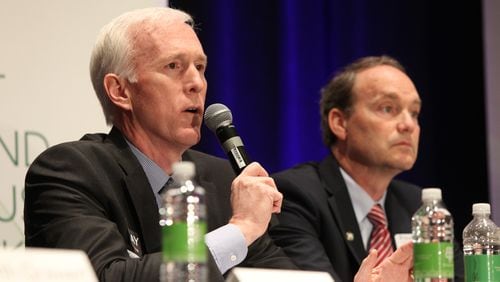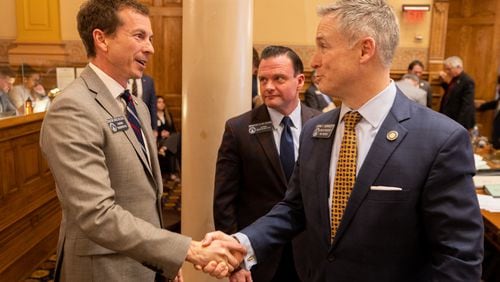The Atlanta Journal-Constitution asked the top contenders in the 6th Congressional District special election, based on public polling, how they would approach several issues facing the district and the country today.
Does the federal government have a role in making sure Americans have health insurance? If so, what would you do to replace or improve the Affordable Care Act?
Bob Gray: The U.S. Constitution, as the governing legal document for the country, does not establish health care as a right. Further, given the design of the Constitution, which specifies that all powers not delegated by the people to the states cannot be delegated to the federal government. Thus, this is an issue for the states, not the federal government, to address.
Big government always makes things more complicated than it needs to be for the American people. I support a full repeal of Obamacare and a return to free-market principles to implement a cost-effective approach to health care. In every industry where we’ve adopted free market always; we see more competition, more choice, greater innovation, lower prices and improved quality. We should model health care after automotive insurance, where individuals pay out of pocket for their “day-to-day” expenses and buy insurance for chronic disease and catastrophic injury.
Karen Handel: It is not the federal government's role to dictate health care choices and decisions to Americans. Americans need a stable, affordable health care system that is market-driven and patient-centered. Congress needs to repeal and replace Obamacare before the entire program collapses, leaving tens of millions of us in jeopardy. The recent bill in Congress, although not perfect, would have been a first step forward for the American people.
Judson Hill: Federal mandates drive up the cost of coverage, and the best way for the federal government to help families get affordable coverage and access to health care is to allow for more flexibility. Obamacare is failing, and the best reforms would increase competition by allowing people to buy insurance across state lines and remove coverage mandates. One of the best ways to lower health care costs is to promote healthy living through wellness incentives.
Dan Moody: Obamacare is not working. Its mandates are job killers, it costs too much and it forces people to buy a product that many of them do not want. Its replacement has to focus on improving patient care and doctor/patient relationships and reducing costs and not creating a massive government bureaucracy. Government almost never works better or more cost-efficiently than the private sector.
Jon Ossoff: It's time to move beyond the 7-year-old partisan debate over the Affordable Care Act. I will work with anyone to promote a health care policy that serves three basic principles: One, no American should suffer or die from preventable or treatable illness. Two, no one should go broke because they get sick. And three, no business should go under or lay off employees because it can't keep up with health insurance premiums. In Congress, I'll work in a bipartisan way so Americans have more choices at better prices with higher quality care. For example, we can increase competition in the insurance market across state lines, offer small business tax credits, and repeal the medical device tax.
Should insurance companies be able to charge people more for health insurance if they have pre-existing conditions?
Gray: Pre-existing conditions should be protected. Preventing health care companies from declining insurance coverage to patients with chronic disease and catastrophic injuries is one of the few regulations that is necessary to actually enable a free market.
Handel: Those with pre-existing conditions should not be priced out of the market. We need an insurance pool to help spread the risk broadly, lower costs and SET some boundaries on the premiums.
Hill: We need to promote healthier lifestyles with wellness incentives and we need to implement high-risk pools.
Moody: Republicans have been calling for coverage of individuals with pre-existing conditions since before Barack Obama was elected president in 2008. What form the cost structure of that takes (premiums, tax credits, etc.) will be worked out by Congress — hopefully in the coming months. I look forward to rolling up my sleeves and helping with that process.
Ossoff: No. Responsible leaders of both parties agree that no American should face financial ruin, suffer or die because they have a pre-existing condition.
Aside from simplifying the nation’s tax code, what changes to the tax system would you make your top priority?
Gray: Again, whenever big government is involved it always makes things more complicated than it needs to be for the American people. The tax code is over 70,000 pages long. It must be simplified. In addition, we must adopt a tax system which drives economic growth which will benefit all Americans. First, we must reduce the corporate income tax rate from 35 percent, the highest and least competitive in the world, to as close to 0 percent as we can get it. By doing so, we will repatriate the $1 trillion or more in profits held by American companies overseas. As a result, profits will be returned to shareholders, which nearly all Americans are in some form or another, companies will invest in capital and equipment, and hire new employees, and increase wages. Second, we must introduce a Fair Tax, as Sen. David Perdue has proposed. With appropriate tax credits for the poor and middle class, we will see revenue increase and productivity improve as income is not taxed. And we will be able to eliminate the (Internal Revenue Service) entirely.
Handel: When looking at the tax code, I would want to lower individual rates with fewer brackets, lower the corporate rate, repatriate overseas income, permanently repeal the death (estate) tax, and review the tax breaks and incentives.
Hill: I would immediately co-sponsor the Fair Tax, so that we tax consumption rather than work. I'd like to see marginal rates on individuals lowered, and I'd like to see us cut the corporate tax from amongst the highest in the world so that we're more competitive in the global marketplace and incentivize companies to repatriate their offshore savings. I would eliminate the marriage tax penalty to help American families, and we should end the taxes embedded in Obamacare as part of the repeal and replace.
Moody: Having the highest corporate tax rate in the industrialized world is driving jobs overseas and must be addressed, and the enormous burden imposed on the middle class by high income taxes is a cruel burden on families. Simplification, reduction of the corporate rate and tax cuts for the middle class are all important. Simpler, lower taxes will create jobs and incomes resulting in more tax revenue in the long term.
Ossoff: A country reveals a lot about its character by the tough choices it makes to balance the books. Any reform to the tax code should include aggressive simplification to ease compliance and improve profitability and competitiveness of American enterprise. The benefits of tax reform should not only flow to the largest organizations that have extraordinary access to congressional committees, but also to small and medium-size businesses and new ventures that have more difficulty raising capital, developing products, and competing with established firms. And in order to lower tax rates, we can eliminate carve-outs and special treatment in the tax code that privilege large organizations at the expense of small businesses.
How would you improve mobility and decrease gridlock in the 6th District?
Gray: Traffic congestion is the single greatest issue addressing the 6th District. It is stifling economic growth and reducing the quality of life of most metro Atlanta residents. We must adopt a multimodal transportation solution. First, we need to provide the transportation infrastructure that facilitates commerce and reduces commercial traffic on our highways. This will require bypasses for trucks around the city of Atlanta. Second, we must expand MARTA within the densely populated areas of the city, as all other major cities do. Third, we must adopt cost-effective alternative transit solutions outside the densely populated areas of Atlanta, notably outside the Perimeter. I'm all for a bus rapid transit system, similar to that in Europe and a few other cities in the U.S. Fourth, we should implement managed lanes that serve as a full express route from major commuting centers to the major employment centers in Atlanta. Lastly, we must invest in the infrastructure for autonomous vehicles that will enable ride sharing in high-quality, high-amenity services that will reduce the number of vehicles on the highways and roads.
Handel: As a former county commission chairman, I understand that state and local elected officials, with their local constituents, drive the specific plans for transportation infrastructure. I will work hand in hand with local leaders and fight to ensure that (the district) receives its fair share of federal transportation funding. I will also work to reduce the red tape and bureaucracy that gets in the way and hinders our local governments from doing their jobs to improve infrastructure in our communities.
Hill: It takes entirely too long for road and bridge projects to get federal approval, with the (Environmental Protection Agency) often obstructing progress. As President Donald Trump has stated correctly, our infrastructure is out of date and inadequate for a nation of our size. We need to block grant more federal transportation dollars back to the states and let them decide what suits their needs best.
Moody: We have a lot of traffic problems and we are going to need a lot of traffic solutions. Improved highway infrastructure is key. Increased transit will become a possibility once MARTA proves it can safely, comfortably and efficiently produce a transportation product we have confidence in. Every transportation option should be looked at.
Ossoff: Our next congressperson has to be prepared to help grow our high-tech economy here into the Silicon Valley of the South and make metro Atlanta one of the world's great commercial cities. That means we need cutting-edge, efficient, reliable transportation solutions that will power our economy. If the administration introduces a fiscally responsible infrastructure bill, I'll work in a bipartisan way to make sure it delivers transformative solutions to Georgia.
About the Author







